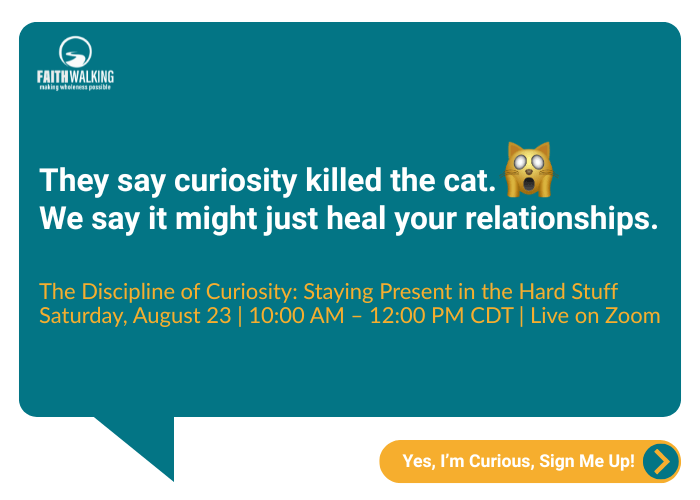We are told, “Be the change you want to see.” But often the case is that first we see change and then are inspired to action. For Tim McGee it was the profound transformational change in his dad that inspired him to join Faithwalking. Tim’s dad started having transformational conversations with him as part of his Faithwalking homework assignments. With time, Tim started noticing a difference in his dad. He started sharing authentically about his struggles. He became a better listener. He was less reactive to anxiety, especially with other family members. Even his demeanor changed.
Tim’s dad never had egregious flaws to overcome, but over time the transformation occurring in him was undeniable. The change Tim saw not only inspired him but also compelled him to action. “Seeing someone’s life so radically changed and the impact it had on the people around him, I couldn’t help but be curious about the impact it could have on my life. “I didn’t go because Dad sold me on it. I went because of the change I saw in him. It seemed worth it to me, to at least explore.”
Soon, Tim was on his own Faithwalking journey.
As a Faithwalking participant Tim in turn initiated his own transformational conversations, some with his dad. A reflective person by nature, Tim had always had a degree of self-awareness, but the teaching in FW 201 helped him begin to understand the meaning behind some of his behaviors. “Understanding why I am reacting a certain way has helped me know how to respond in moments of high anxiety,” Tim says.
Next Steps
The next step for Tim is committing to a missional community. He feels called to join a particular one, a community partnership between two churches, Calvary Community Church (where his dad is Executive Pastor) and Copperfield Church, and Hairgrove Elementary School in Cy Fair. The partnership provides mentors, provision of supplies, and program support for the school. The two churches were recently recognized at a state level by the Texas Association of Partners in Education (TAPE) for their positive impact on student academic achievement. Tim feels drawn to this missional community, and he even already knows the specific role he wants to play within it—that of a follower. Why a follower? Because being a follower goes against a negative vow from his early childhood. In primary school Tim’s teachers pulled him out of class for specialized tutoring because he struggled. Rather than help him, it demoralized him. Gradually his attitude toward school and authority went downhill. In due course he came to a conclusion: “The people who are supposed to know best don’t really know. Authority does not know what is best—only I know.”
Tim became fiercely independent. He developed his own test-taking skills, advancing through school passing tests without studying and passing classes without doing the homework. His continual success in “getting by” reinforced his negative vow that “his way was the best way.” Not everything that came out of that vow was negative, however. Tim became a self-starter and a good problem solver. He pursued entrepreneurial endeavors, such as starting his own marketing firm while he was still a senior at Baylor University. But Tim operated as a “Lone Ranger,” even leaving groups and starting his own so he could do things “his way.”
Faithwalking helped him see that his rugged independence was also a negative reaction to authority. Instead of doing things his way, Tim is committed to submitting himself to the leadership and authority of a missional community, to flex his “follower muscle,” as he puts it. “Being a follower doesn’t come naturally to me at all. It goes against the vow I made that is the basis for everything I do.” His current vision to be a good follower is a way of pressing into a new, positive vow—one that trusts God and others.


